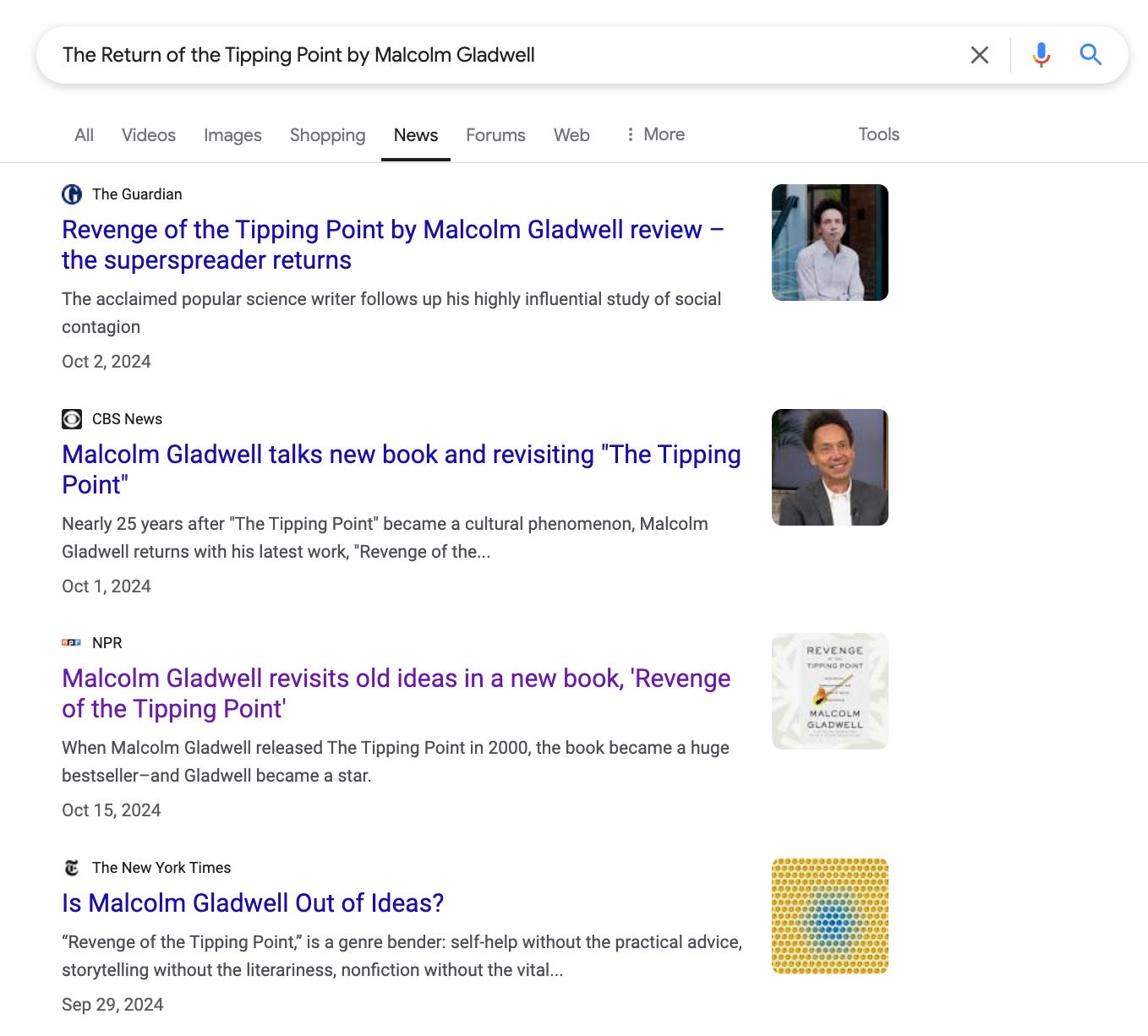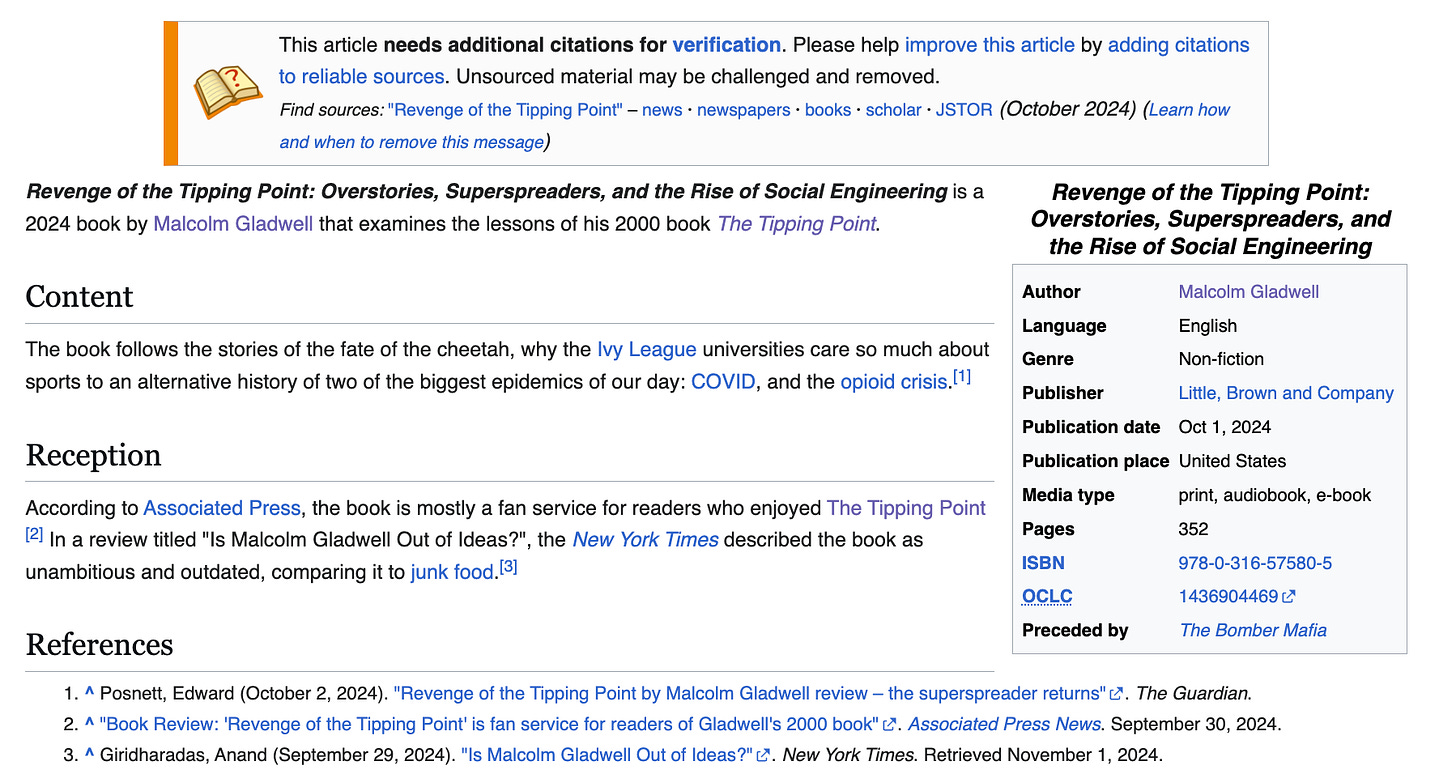Do you deserve your own Wikipedia page?
Probably not. Let’s go through my test that determines whether you should have one or not, using Malcolm Gladwell's latest book as our test subject.
People are always asking me what it takes to get a Wikipedia page. Many seem to believe it’s easy. That they just have to know the right person and that, by knowing me, they’ve accomplished the hardest part.
The reality is that knowing a Wikipedia editor not only won’t guarantee you an article on Wikipedia, but it may even hurt your chances of successfully seeing one come to life. Remember: Wikipedia is not a tool designed to promote you or your business. It’s a volunteer-maintained encyclopedia with a set of volunteer-enforced rules.
So before you decide whether or not you personally are important enough to deserve a Wikipedia article, let me take you through how I decide if I’m going to personally attempt to make a Wikipedia article on a certain subject. For our purposes today, let’s look at the Wikipedia article I most recently created: Revenge of the Tipping Point, the article for Malcolm Gladwell’s latest work of nonfiction.
Who and what deserves a Wikipedia article?
If you think you deserve a Wikipedia article, begin by asking yourself one simple question: am I notable?
Wait. Don’t do that. That’s too harsh of an exercise and could easily send you into an existential crisis. Instead, pick a book off your bookshelf and ask “is this notable?” Or a movie you’ve seen. Or a business you went to recently. A person you admire. A hobby of yours.
But wait, how are you to determine this without first knowing what it means to be notable?
What is notability, Wikipedia?
The Wikipedia GNG (general notability guideline) says a subject is: “presumed to be suitable for a stand-alone article or list when it has received significant coverage in reliable sources that are independent of the subject.”
There’s a lot happening in that sentence, so I’ll tell you my test in determining if a subject deserves a Wikipedia article. This is not a universal test, but my own personal system (although yes, I think that if you put this same system into practice, it will work for you and I know that many other Wikipedia editors use the same or similar systems.)
Question 1: Are there a significant number of results when you type the name of the subject into Google and go to the News results?
Let’s take two books through this test right now:
The Revenge of the Tipping Point by Malcolm Gladwell
Top 10 Games You Can Play in Your Head, By Yourself, edited by Sam Gorski and D. F. Lovett
I chose these books because I have a personal connection to both of them (although only a conflict of interest with one of them.) I am one of the co-editors of the bestselling games book Top 10 Games You Can Play in Your Head, By Yourself, which means I know a lot about it but that my conflict of interest prevents me from having anything to do with its Wikipedia article. Meanwhile, I haven’t read The Revenge of the Tipping Point but I did create the Wikipedia article for it.
So, let’s type “the revenge of the tipping point” into the Google search bar and go to the News tab. Here’s what we see:
Right away, that’s looking pretty good for Mr. Gladwell’s book. If I scroll to the bottom of the page, I see there are at least ten pages of news results for this search term.
Okay, now let’s do the same thing for: Top 10 Games You Can Play in Your Head, By Yourself, edited by Sam Gorski and D. F. Lovett. I type it into the search bar, go to news, and:
Hmm. That’s not looking good, is it? That’s one news source. That alone is typically enough for me to decide that a subject is not going to get an article—or at least I’m not going to be the one to create it.
So now we’ve disqualified one of these two books so far, based solely on Google news results. But that doesn’t mean Gladwell is in yet. His book passed the first test but there are several more left that we have to take him through.
Question 2: Are the news results focused on the subject?
Next thing I do is take a look at the news results. I want to make sure that these aren’t “passing mentions.” Let’s look at a full page screenshot of the first page of Google news results:
This is again looking again for Gladwell’s book, seeing as it looks like a lot of reviews and press. These are not mentions of Gladwell’s book within an article about something else. If the headline was something like “8 Books You Haven’t Heard of That Came Out in 2024,” we would be dealing with a different situation.
Question 3: Are the news results legit third-party sources, in the standards of Wikipedia?
Now we need to give another level of scrutiny. We can’t earn a Wikipedia article with 80 press releases. It isn’t until page 2 that I get to the first example of something that is not legit:
The results before this are all reviews from reputable organizations, while this is a self-published review on Substack. To be clear, I haven’t read the review in question but it looks, at best, unreliable to me. In general, blogs and newsletters are not up to Wikipedia’s standards of reliability.
But overall, looking good again! This is not just a pile of press releases or blog posts.
Question 4: Are there other Wikipedia articles that mention this subject?
If something is truly “notable,” it’s likely that it has been mentioned before in another article. Let’s take a look for each of these two books again. While I’ve already disqualified T10GYCIPYHBY from consideration for an article, I would like to see what shows up.
Here is the internal Wikipedia search for “top 10 games you can play in your head by yourself”
It’s mentioned on one page. That’s not much, but it’s more than a lot of non-notable subjects currently have.
And here is the internal search for The Revenge of the Tipping Point:
What I should’ve done is taken a screenshot before I created the article. But what we see here are two other articles referencing The Revenge of the Tipping Point (at least once you click into them.)
Why does this matter?
If there aren’t other pages mentioning a subject, it’s likely the subject’s article, if created, will be flagged as an “orphan” page and be flagged for deletion sooner. Okay, I’m going to go with “inconclusive” on this one for each of these.
Question 5: Are there any other notability criteria or considerations?
In the case of books, there are many other criteria to consider, including:
The book has won a major literary award.
The book has been considered by reliable sources to have made a significant contribution to any of the sciences, humanities or arts, or to a notable or significant motion picture, or other art form, or event or political or religious movement.
The book is, or has been, the subject of instruction at two or more schools,[6] colleges, universities or post-graduate programs in any particular country.[7]
The book's author is so historically significant that any of the author's written works may be considered notable. This does not simply mean that the book's author is notable by Wikipedia's standards; rather, the book's author is of exceptional significance and the author's life and body of written work would be a common subject of academic study.
Books are not the only category with these extra critera. There are special sets of considerations for people, organizations and even geographic features.
But to return to our two books, I think you see another argument for Gladwell’s book, in the form of:
The book's author is so historically significant that any of the author's written works may be considered notable. This does not simply mean that the book's author is notable by Wikipedia's standards; rather, the book's author is of exceptional significance and the author's life and body of written work would be a common subject of academic study.
Whether you like Gladwell’s writing or not, I think the argument can be made that he passes this test, especially as each of his other books have had an article created. However, if he had a new book that did not have third-party sources—i.e. a book so irrelevant that no significant third parties reviewed it—then I don’t think the argument could be made. So I’m going with inconclusive on this one.
The same “inconclusive” argument cannot be made for T10GYCPIYHBY and its editors. So while Gladwell’s book gets an “inconclusive” on this one, it’s a hard no on T10GYCPIYHBY.
So, do these books deserve Wikipedia articles?
In summary, let’s look at the results for each of these:
For The Revenge of the Tipping Point:
Are there a significant number of results when you type the name of the subject into Google and go to the News results? Yes
Are the news results focused on the subject? Yes
Are the news results legit third-party sources, in the standards of Wikipedia? Yes
Are there other Wikipedia articles that mention this subject? Yes, but not enough to be conclusive
Are there any other notability criteria or considerations? Inconclusive.
For T10GYCPIYHBY
Are there a significant number of results when you type the name of the subject into Google and go to the News results? No.
Are the news results focused on the subject? NA.
Are the news results legit third-party sources, in the standards of Wikipedia? NA.
Are there other Wikipedia articles that mention this subject? Yes, but not enough to be conclusive
Are there any other notability criteria or considerations? No.
And here is a final question: is there a conflict of interest that you might personally face in trying to create an article for this subject?
In my case, I have no conflict of interest for RotTP but I definitely have one for the book that I’m an editor of. So even if Top 10 Games passed all the tests here, I still would not be the person to create it. But that’s a topic for another day.
All of this is what led me to publish this article:
Before my involvement, it was an unpublished draft that looked like this:
The most important change was taking it from three references—which is not enough—and getting it up to ten. If you’re looking for that magic number of how many references to be notable is enough, ten is the number I prefer.
Thanks for reading. What’s next?
I’ve taken the book Monsters: A Fan's Dilemma by Claire Dederer through this same test and it passed. So that’s the Wikipedia article I intend to create in the coming weeks.
And get excited, because the next post I’ll be publishing on Edit History is a look at some of the Wikipedia considerations (and drama) around the Baldoni v. Blakely Trial of Public Opinion.











I dunno, I kicked off the MMORPG industry when I created GāmBit MultiSystems in 1983, as noted by historian Prof. Ricard Bartle in his books "Designing Virtual Worlds," and "MMOs from the Inside Out." Then I co-authored the first Internet search and browse tool, Internet Gopher, in 1991 (RFC 1436). Oh, right, I also founded the adoptee-rights organization Bastard Nation that has opened adoption records for adult citizens across America (bastards.org), the literary executorship the Tekumel Foundation (tekumel.com), and Fearless Comedy Productions (fearlesscomedy.org).
But if you Google my name you still get the musician who was the bandleader for "Name That Tune" in 1970. And yes, HE has a Wikipedia page.
See, I can accept I wasn’t notable, but it could have been conveyed differently. 🤣